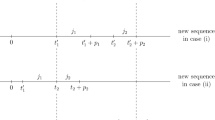Abstract
Shifting bottleneck (SB) algorithms have been successful in solving most real-sized scheduling problems. However, it is known that under certain conditions, solution quality degrades because of subproblem interactions. Changing the order in which subproblems are solved greatly affects the solution quality. We demonstrate that for some class of problems it is possible to induce production (IF–THEN) rules that determine the subproblem solution order and lead to good quality solutions, matching the performance of the SB algorithm in most other instances.
Similar content being viewed by others
References
Adams, J., Balas, E. and Zawack, D. (1988) The shifting bottleneck procedure for job-shop scheduling. Management Science, 34, 391–401.
Applegate, D. and Cook, W. (1991) A computational study of job shop scheduling. ORSA Journal of Computing, 3, 149–156.
Aytug, H., Kempf, K. and Uzsoy, R. (2002) Measures of criticality for decomposition algorithms in scheduling. Working Paper, DIS Department, University of Florida, Gainesville, FL, 32611.
Aytug, H., Koehler, G. J. and Snowdon, J. L. (1994) Genetic learning of dynamic scheduling within a simulation environment. Computers and Operations Research, 21, 909–925.
Bhaskaran, K. and Pinedo, M. (1991) Dispatching, in Salvendy G. (ed.) Handbook of Industrial Engineering, John Wiley, New York.
Carlier, J. and Pinson, E. (1989) An algorithm for solving the job-shop problem. Management Science, 35, 164–176.
Chen, C. C. and Yih, Y. (1996) Identifying attributes for knowledge-based development in dynamic scheduling environments. International Journal of Production Research, 34, 1739–1755.
Clancy, D. P. and Mohan, S. (1990) RBD Rule based job dispatching software for implementing production plans. First International Conference on Expert Planning Systems, 100–103.
Cohen, P. R. and Feigenbaum, E. A. (1982) The Handbook of Artificial Intelligence, Addison Wesley, Reading, MA.
Demirkol, E., Mehta, S. V. and Uzsoy, R. (1997) Computational study of shifting bottleneck procedures for shop scheduling problems. Journal of Heuristics, 3, 111–137.
Dorndorf, U. and Pesch, E. (1995) Evolution based learning in a job shop scheduling environment. Computers and Operations Research, 22, 25–40.
Fox, M. S. (1990) Constraint-guided scheduling a short history of research at CMU. Computers in Industry, 14, 79–88.
Garey, M. R. and Johnson, D. S. (1979) Computers and Intractability: A Guide to the Theory of NP-Completeness, W.H. Freeman, San Francisco.
Goldrat, E. M. and Fox, R. E. (1986) The Goal: A Process of Ongoing Improvement, North River Press, New York.
Holtsclaw, H. H. and Uzsoy, R. (1996) Machine criticality measures and subproblem solution procedures in shifting bottleneck methods: a computational study. Journal of the Operational Research Society, 47, 666–677.
Johnson, S. M. (1954) Optimal two-and three-stage production schedules with set-up times included. Naval Research Logistics Quarterly, 1, 61–68.
Lamatsch, A., Morlock, M., Neumann, K. and Rubach, T. (1988) SCHEDULE An expert-like system for machine scheduling. Annals of Operations Research, 16, 425–438.
Langley, P. (1996) Elements of Machine Learning, Morgan Kaufmann Publishers Inc., San Francisco.
Matsuo, H., Suh, C. J. and Sullivan, R. S. (1988) A controlled search simulated annealing approach for the general job shop scheduling problem. Working Paper 03–04–88, Department of Management, Graduate School of Business, University of Texas, Austin.
Nakasuka, S. and Yoshida, T. (1992) Dynamic scheduling system utilizing machine learning as knowledge acquisition tool. International Journal of Production Research, 30, 411–431.
Natarajan, B. K. (1991) Machine Learning, A Theoretical Approach, Morgan Kaufmann Publishers Inc., San Mateo.
Osisek, V. (2001) Learning decomposition sequence heuristics for scheduling. Ph.D. Dissertation, UNC-Charlotte.
Ovacik, I. M. and Uzsoy, R. (1997) Decomposition Methods for Complex Factory Scheduling Problems, Kluwer Academic Publishing.
Pinedo, M. and Singer, M. (1996) A shifting bottleneck heuristic for minimizing the total weighted tardiness in a job shop. Research Report, Stern School of Business, New York University.
Piramutha, S., Park, S.-C. and Shaw, M. J. (1993) Integration of simulation modeling and inductive learning in an adaptive decision support system. Decision Support Systems, 9(1), 127–142.
Quinlan, J. R. (1986) Induction of decision trees. Machine Learning, 1, 81–106.
Quinlan, J. R. (1993) C4.5 Programs for Machine Learning, Morgan Kaufmann Publishers, Inc.
Skiena, S. S. (1998) The Algorithm Design Manual. Springer-Verlag, New York.
Uzsoy, R. and Wang, C.-S. (2000) Performance of decomposition procedures for job-shop scheduling problems with bottleneck machines. International Journal of Production Research, 38, 1271–1286.
Author information
Authors and Affiliations
Corresponding author
Rights and permissions
About this article
Cite this article
Osisek, V., Aytug, H. Discovering subproblem prioritization rules for shifting bottleneck algorithms. Journal of Intelligent Manufacturing 15, 55–67 (2004). https://doi.org/10.1023/B:JIMS.0000010075.60589.58
Issue Date:
DOI: https://doi.org/10.1023/B:JIMS.0000010075.60589.58




